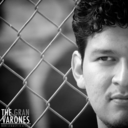Geraldo: When I was 16, I identified myself as bisexual. I remember one time, my mother went to go use our Windows 95 laptop and I was sitting on the bed shaking. I was shivering. I wasn’t sure how she would take it. So I said “What would you say if I told you that I was bisexual?” What I got wasn’t the typical answer, it was “We’ll talk it about.” She left the room and we never spoke about it. But we didn’t need to because every time people came over, (my mom would be like) “Oh my god, this is my son Geraldo, he’s gay and I love him.” I kinda always knew that it was going to be okay because I have two gay uncles. Growing up, I never knew that being “straight” was how how you were “supposed” to grow up. Being gay was normal to me. It was never “wrong” in my family; it was always accepted.
Louie: How about in school? Were you teased there or made to feel different?
Geraldo: I was teased for being overweight. I was belittled. I was teased for being gay. I was teased in elementary school until high school. I was called the “F” word, I was called “fairy boy.” The whole nine yards, you name it – I was called it.
Louie: Did you tell teachers?
Geraldo: I never really told teachers. I felt like every time something was brought up to a teacher, they would never really handle it so, I just kept it myself and I didn’t really share it with anybody else.
Louie: How about your mother? Did you ever tell her?
Geraldo: I didn’t because I didn’t want her to worry about me. I knew I was really strong and I knew I could handle it by myself. I made a game plan for myself. I was always the happy one. It was always “Talk to Gerlado, he’ll give you the support.” Having people come to me for support was leverage for me. I didn’t have to tell anyone because I was always dealing with other people’s issues and stuff. So that was like my break.
Louie: Did school ever get better?
Geraldo: It did. After 9th grade, I guess everyone just realized that I was “normal” guy who just liked guys. Everyone saw me as Geraldo for once and not just the “gay guy.”
Louie: What is the greatest lesson you have learned that guides your life right now?
Geraldo: I think
the greatest lesson that I have ever learned is to live life but not in the
moment. In life, we always live in the moment, we never see what is around us.
I always tell people – come out your box. It’s so easy, just lift the top up
and you really look at what life has to offer you. You look at the past, you
look at the present and you also look at the future. Inside our box, we are so
enclosed in our surroundings, we can’t see what’s beyond and what’s before us
and we cannot add those perspectives. Gain knowledge from the pass and use that
for the future. Be open minded and not bitter. Living life is an
experience.
Geraldo Oyola, Philadelphia
Interviewed & Photographed by: Louie A. Ortiz-Fonseca

